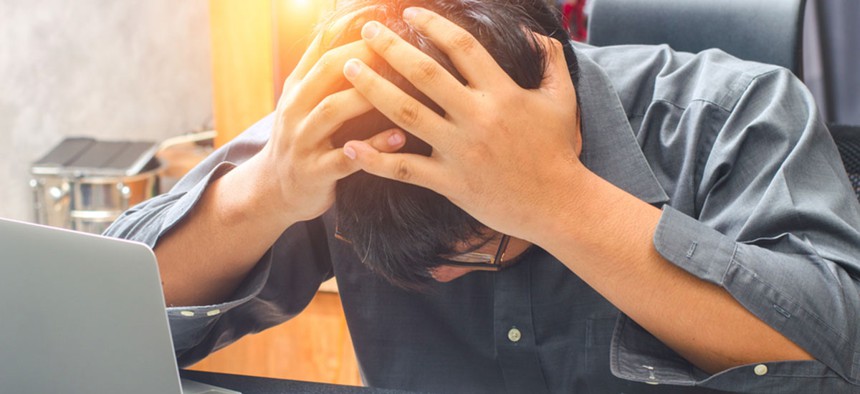
Shutterstock.com
It Turns Out Men, Not Women, Suffer More From Imposter Syndrome
A recently-published study flips the gender dynamic of imposter syndrome on its head.
Imposter syndrome, according to conventional wisdom, plagues women far more than men. As if it weren’t enough that women have to deal with men casting aspersions at them for not being competent leaders orfor being too emotional, the notion of imposter syndrome—whereby high-achieving people disparage their own success as pure luck and worry that they’ll be uncovered as incompetent—has typically been thought of as a female trait.
I first learned about this two years ago, when my editor at the time asked me to write on the subject. Instead of feeling understood or validated, I felt defensive. It had never occurred to me to look around my male dominated industry and worry that I didn’t belong; the notion that I should relate to imposter syndrome seemed to imply that I deserved to feel like a fraud. As I started to report the article, I worried that not suffering from imposter syndrome would be interpreted as a sign of arrogance. This concern, it turns out, is well-founded. Contrary to stereotypes, research suggests women are as confident as men—they are just penalized rather than rewarded for the same self-assuredbehavior.
But a recently published research paper flips the assumed gender dynamic of imposter syndrome on its head. It turns out that men also suffer from imposter syndrome, and, in certain circumstances, they experience its effects more than women.
The paper, published online last month and due to appear in the September 2018 edition of the journal Personality and Individual Differences, involved two studies of more than 500 undergraduates at a large US public university. In the first study, 268 students (58.5% male) were given five questions in the style of the GRE (the exam students take for admission to graduate school); half were randomly told they’d got all the questions right, while the other half were told they’d got all the questions wrong. They were then given another set of five questions and finally told their actual results.
In the second study of 250 students (55.5% male), half were randomly told that their scores would be shared with the professor of a management class they were taking at the time (defined as the “high accountability” group), while half were told their performance would be shared with a random stranger who wouldn’t know their identity (“low accountability”). Then all were asked to complete five GRE questions.
In both studies, participants were tested for imposter syndrome using the Impostor Phenomenon Scale, which was developed by one of the psychologists that first identified imposter syndrome. The assessment asks participants to rate how strongly they agreed with statements such as “I rarely do a project or a task as well as I’d like to do it,” and “Sometimes I’m afraid others will discover how much knowledge or ability I really lack” on a 1 to 7 scale. After completing the task, participants were also evaluated for anxiety by indicating, on a scale from 1 to 4, how much they felt “calm,” tense,” upset,” relaxed,” and “content.”
Overall, women self-reported more imposter syndrome according to the scale. But the researchers found that men experienced more stress both when getting negative feedback and when told their results would be shared with the professor. “Collectively, our findings suggest that male IPs [imposters] fair worse when confronted with performance cues than do female impostors,” the authors wrote. “Male IPs experienced greater anxiety after receiving negative feedback and under conditions of high accountability than did female IPs, and exhibited less effort and poorer performance on a task when held accountable to a higher authority.”
Conversation around imposter syndrome has always been gendered. But its balance has been slowly shifting over the past few decades. The condition was first identified in 1978 by two clinical psychologists, whose study only focused on women. In the years since, gender-related data on the subject have been mixed. Some have found that women do experience more imposter syndrome, while others have found no correlation.
As this latest study highlights, the very notion of imposter syndrome is slippery. Though psychologists can test for the sense of feeling like an imposter, this is not a permanent state or a clearly defined medical disorder. Someone might feel like an imposter one day, and not at all another. And even though the men in the study self-reported lower feelings of imposter syndrome, they reacted with greater stress and imposter-syndrome-like symptoms when put under pressure.
Though discussions around imposter syndrome as a gendered issue may be well-meaning, they arguably place an extra burden on women to solve gender disparities in the workplace, by encouraging them to overcome their feelings of inadequacy. Given that recent research shows that imposter syndrome is widespread across demographics, affecting both men and women, then why would this universal trait only hold back those of one gender? An alternative suggestion seems more plausible: That external sexist assessments of women are the cause of such inequalities. We should focus on challenging these judgements, rather than telling women they need to address their own insecurities.
There’s also more of an individual, rather than structural, lesson from the latest imposter syndrome research: Namely, everybody worries. The last time I wrote on imposter syndrome, I confidently asserted that I didn’t suffer from the issue. Then I experienced a whirl of anxiety about the inadequacies of that particular article. It would be inhuman, I realized, not to have moments of doubt. And even the most seemingly self-assured and successful alpha males have experienced similar fears at some point. Deep-seated insecurity isn’t just a political gendered issue, but also a personal one.






